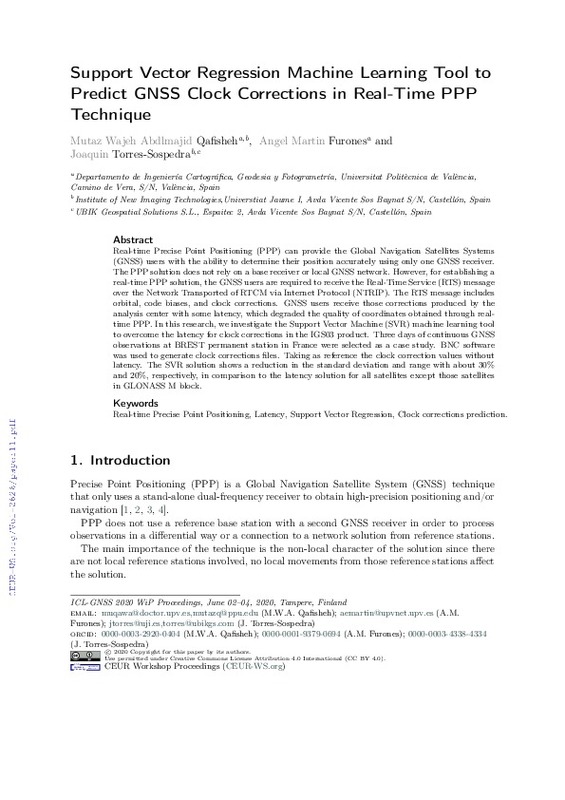JavaScript is disabled for your browser. Some features of this site may not work without it.
Buscar en RiuNet
Listar
Mi cuenta
Estadísticas
Ayuda RiuNet
Admin. UPV
Support Vector Regression Machine Learning Tool to Predict GNSS Clock Corrections in Real-Time PPP Technique
Mostrar el registro sencillo del ítem
Ficheros en el ítem
| dc.contributor.author | Qafisheh, Mutaz Wajeh Abdlmajid
|
es_ES |
| dc.contributor.author | Martín Furones, Ángel Esteban
|
es_ES |
| dc.contributor.author | Torres-Sospedra, Joaquín
|
es_ES |
| dc.date.accessioned | 2021-12-20T08:39:00Z | |
| dc.date.available | 2021-12-20T08:39:00Z | |
| dc.date.issued | 2020-06-04 | es_ES |
| dc.identifier.issn | 1613-0073 | es_ES |
| dc.identifier.uri | http://hdl.handle.net/10251/178545 | |
| dc.description.abstract | [EN] Real-time Precise Point Positioning (PPP) can provide the Global Navigation Satellites Systems (GNSS) users with the ability to determine their position accurately using only one GNSS receiver. The PPP solution does not rely on a base receiver or local GNSS network. However, for establishing a real-time PPP solution, the GNSS users are required to receive the Real-Time Service (RTS) message over the Network Transported of RTCM via Internet Protocol (NTRIP). The RTS message includes orbital, code biases, and clock corrections. GNSS users receive those corrections produced by the analysis center with some latency, which degraded the quality of coordinates obtained through realtime PPP. In this research, we investigate the Support Vector Machine (SVR) machine learning tool to overcome the latency for clock corrections in the IGS03 product. Three days of continuous GNSS observations at BREST permanent station in France were selected as a case study. BNC software was used to generate clock corrections files. Taking as reference the clock correction values without latency. The SVR solution shows a reduction in the standard deviation and range with about 30% and 20%, respectively, in comparison to the latency solution for all satellites except those satellites in GLONASS M block. | es_ES |
| dc.language | Inglés | es_ES |
| dc.publisher | CEUR Workshop Proceedings | es_ES |
| dc.relation.ispartof | Proceedings of the International Conference on Localization and GNSS (ICL-GNSS 2020) | es_ES |
| dc.rights | Reconocimiento (by) | es_ES |
| dc.subject | Real-time precise point positioning | es_ES |
| dc.subject | Latency | es_ES |
| dc.subject | Support vector regression | es_ES |
| dc.subject | Clock corrections prediction | es_ES |
| dc.subject.classification | INGENIERIA CARTOGRAFICA, GEODESIA Y FOTOGRAMETRIA | es_ES |
| dc.title | Support Vector Regression Machine Learning Tool to Predict GNSS Clock Corrections in Real-Time PPP Technique | es_ES |
| dc.type | Comunicación en congreso | es_ES |
| dc.type | Artículo | es_ES |
| dc.rights.accessRights | Abierto | es_ES |
| dc.contributor.affiliation | Universitat Politècnica de València. Departamento de Ingeniería Cartográfica Geodesia y Fotogrametría - Departament d'Enginyeria Cartogràfica, Geodèsia i Fotogrametria | es_ES |
| dc.description.bibliographicCitation | Qafisheh, MWA.; Martín Furones, ÁE.; Torres-Sospedra, J. (2020). Support Vector Regression Machine Learning Tool to Predict GNSS Clock Corrections in Real-Time PPP Technique. CEUR Workshop Proceedings. 1-8. http://hdl.handle.net/10251/178545 | es_ES |
| dc.description.accrualMethod | S | es_ES |
| dc.relation.conferencename | International Conference on Localization and GNSS (ICL-GNSS 2020) | es_ES |
| dc.relation.conferencedate | Junio 02-04,2020 | es_ES |
| dc.relation.conferenceplace | Tampere, Finland | es_ES |
| dc.relation.publisherversion | http://www.ceur-ws.org/Vol-2626/ | es_ES |
| dc.description.upvformatpinicio | 1 | es_ES |
| dc.description.upvformatpfin | 8 | es_ES |
| dc.type.version | info:eu-repo/semantics/publishedVersion | es_ES |
| dc.relation.pasarela | S\414508 | es_ES |






